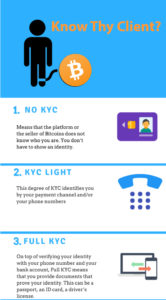KYC
 Know your customer (KYC) is the process of a business identifying and verifying the identity of its clients. The term is also used to refer to the bank and anti-money laundering regulations which governs these activities. Know your customer processes are also employed by companies of all sizes for the purpose of ensuring their proposed agents, consultants, or distributors are anti-bribery compliant. Banks, insurers and export creditors are increasingly demanding that customers provide detailed anti-corruption due diligence information.
Know your customer (KYC) is the process of a business identifying and verifying the identity of its clients. The term is also used to refer to the bank and anti-money laundering regulations which governs these activities. Know your customer processes are also employed by companies of all sizes for the purpose of ensuring their proposed agents, consultants, or distributors are anti-bribery compliant. Banks, insurers and export creditors are increasingly demanding that customers provide detailed anti-corruption due diligence information.
The objectives of KYC guidelines is to prevent banks from being used, intentionally or unintentionally, by criminal elements for money laundering activities. Related procedures also enable banks to better understand their customers and their financial dealings. This helps them manage their risks prudently. Banks usually frame their KYC policies incorporating the following four key elements:
- Customer Acceptance Policy;
- Customer Identification Procedures;
- Monitoring of Transactions; and
- Risk management.
For the purposes of a KYC policy, a Customer/user may be defined as:
- a person or entity that maintains an account and/or has a business relationship with the bank;
- one on whose behalf the account is maintained (i.e. the beneficial owner);
- beneficiaries of transactions conducted by professional intermediaries such as stockbrokers, Chartered Accountants, or solicitors, as permitted under the law; or
- any person or entity connected with a financial transaction which can pose significant reputational or other risks to the bank, for example, a wire transfer or issue of a high-value demand draft as a single transaction




